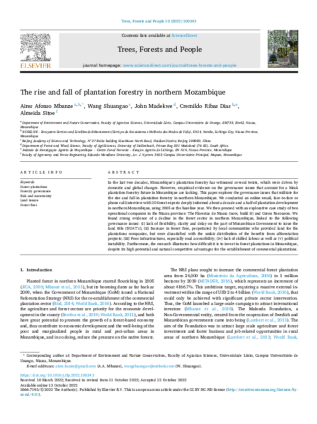In the last two decades, Mozambique’s plantation forestry has witnessed several twists, which were driven by domestic and global changes. However, empirical evidence on the governance issues that account for a bleak plantation forestry future in Mozambique are lacking. This paper explores the governance issues that militate for the rise and fall in plantation forestry in northern Mozambique. We conducted an online email, face-to-face or phone call interview with 20 forest experts deeply informed about a decade and a half of plantation development in northern Mozambique, using 2005 as the baseline year. We then proceed with an explorative case study of two operational companies in the Niassa province: The Florestas do Niassa (now, build it) and Green Resources. We found strong evidence of a decline in the forest sector in northern Mozambique, linked to the following governance issues: (i) lack of flexibility, clarity and delay on the part of Mozambican Government to issue the land title (DUAT’s); (ii) Increase in forest fires, perpetrated by local communities who provided land for the plantations companies, but were dissatisfied with the unfair distribution of the benefits from afforestation projects; (iii) Poor infrastructures, especially road accessibility; (iv) lack of skilled labour as well as (v) political instability. Furthermore, the research illustrates how difficult it is to invest in forest plantations in Mozambique, despite its high potential and natural competitive advantages for the establishment of commercial plantations.
Type
Document
Date of Publication
Oct 01, 2022
Language
English
Description/Abstract
Copyright/Licence
Unknown
Latest Resources
A comprehensive scoping and assessment study of climate smart agriculture (CSA) policies in Namibia
Agriculture climato-intelligente à Madagascar Climate-smart agriculture in Madagascar
Agronomic assessment of a taro-bambara intercrop under rainfed conditions
Approaches to Reinforce Crop Productivity under Water-Limited Conditions in Sub-Humid Environments in Sub-Saharan Africa







